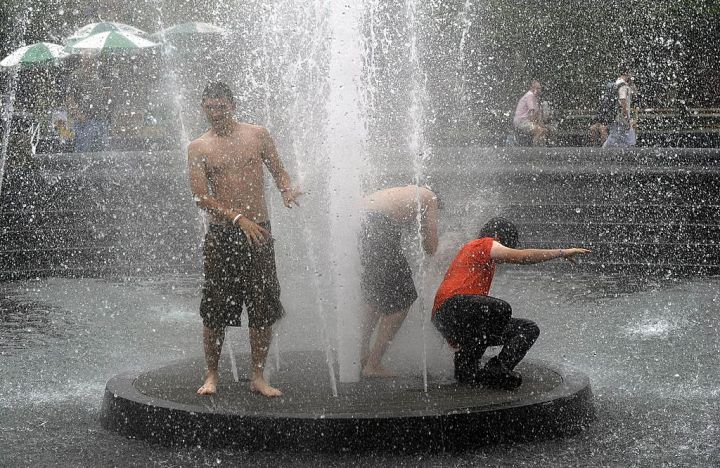
Cities’ summer challenge: Keep people cool while keeping COVID-19 at bay
Cities’ summer challenge: Keep people cool while keeping COVID-19 at bay

In the age of social distancing and other efforts to limit the spread of COVID-19, cities are grappling with whether to encourage vulnerable populations to leave their homes during extreme heat and congregate under a communal air-conditioning system or stay home and hope that the summer heat doesn’t make them sick.
“It’s a hard time because every choice we have seems to be a decision between two really bad options,” said New York University sociologist Eric Klinenberg, author of “Heat Wave: A Social Autopsy of Disaster in Chicago,” which examines the 1995 heat wave that killed more than 700 people in the Windy City.
The death toll in Chicago prompted cities to start opening cooling centers, places with air-conditioning systems where residents who were vulnerable to heat-induced illness could stay cool.
But air-conditioning systems can spread airborne pathogens like the novel coronavirus.
Meanwhile, “the same communities that are vulnerable to challenges from heat are also most vulnerable to the virus as well,” said Robert Blaine, the chief administrative officer for the city of Jackson, Mississippi. Those vulnerable populations specifically are the poor, the elderly and people of color.
Jackson’s population is more than 80% Black, and in a typical summer, the city has at least 25 days when the heat index — a measure of how temperature feels to the human body — rises above 95 and it opens cooling centers.
This year, the city hasn’t opened the centers at all, Blaine said.
“We’ve been concerned about our ability, our resources, to control social distancing in those spaces,” he said.
Cities across the country are facing the same conundrum. May was one of the world’s hottest Mays on record, and scientists at the National Oceanic and Atmospheric Administration have predicted that this summer will be hotter than average across most of the country.
Even in a typical summer, heat kills hundreds of Americans.
“Cities can’t [just] do one or the other. They can’t either protect their citizens from heat or protect their citizens from COVID-19,” said Kristie Ebi, who researches the health risks of climate variability at the University of Washington. “They have to do both.”
Before the pandemic, people had a lot of options when the weather got hot, said sociologist Klinenberg.
“A cooling center doesn’t have to be a government building with the words ‘Cooling Center’ stamped on it. It can be a mall, it can be a movie theater, it can be a restaurant, it can be a coffee shop,” he said. “The problem this summer is that many of those places are closed.”
And that’s forced city officials to improvise, Klinenberg said. “Instead of careful planning, now we’re getting all sorts of ad hoc measures.”
Phoenix has used its convention center as a cooling center. Philadelphia parked city buses with the AC running. New York City is giving away air conditioners to eligible residents.
Meanwhile, other cities aren’t doing anything because they’re under state orders not to congregate in large groups.
Mark Stemen, a professor at California State University, Chico, who teaches sustainability and climate action, worked on the city’s extreme heat plan. Chico’s cooling centers aren’t open, he said, and that’s a problem because the city has recently gained around 20,000 residents who were displaced by wildfires.
“These disasters kind of stack up on top of each other. It’s just become more and more difficult for a community like ours,” Stemen said.
For now, the city’s distributing cold water to homeless camps and low-income residents as temperatures climb above 100 degrees. At the same time, officials are trying to limit the spread of COVID-19 and planning how to deal with this year’s wildfire season.
And with all of that going on, Stemen said, Chico doesn’t have the capacity to make long-term plans.
There’s a lot happening in the world. Through it all, Marketplace is here for you.
You rely on Marketplace to break down the world’s events and tell you how it affects you in a fact-based, approachable way. We rely on your financial support to keep making that possible.
Your donation today powers the independent journalism that you rely on. For just $5/month, you can help sustain Marketplace so we can keep reporting on the things that matter to you.


















